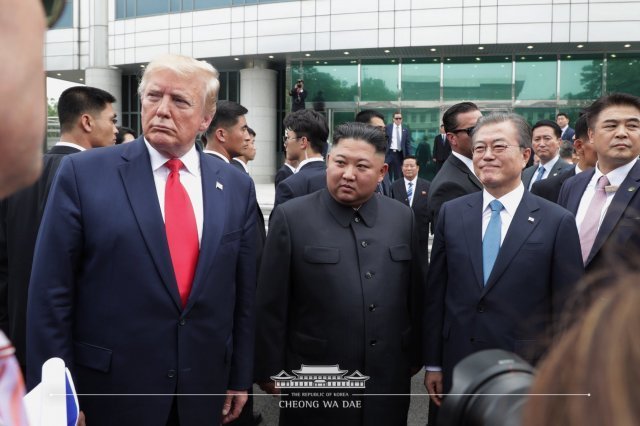Could Moon act as special envoy to North Korea?
Former South Korean president’s ‘friendly ties’ with North Korean leader Kim Jong-un may play positive in talks with Pyongyang
By Jo He-rimPublished : May 17, 2022 - 18:53

US President Joe Biden’s plans to meet former South Korean President Moon Jae-in during his visit to Seoul this weekend, have raised eyebrows, as Moon no longer holds office.
The schedule has prompted observers to speculate on the purpose of the meeting, with the possibility that Seoul and Washington are considering asking Moon to serve as an intermediary to North Korea among the most widely held expectations.
Former Unification Minister Chung Se-hyun said Biden was meeting Moon for a reason, as Moon has a “special relationship” with North Korea’s leader Kim Jong-un.
“President Biden is busy and would not meet (former) President Moon simply out of their friendship from the few summits they’ve held before,” Chung said in a local radio interview Monday, asserting that the meeting was “useful” for Biden.
“There are two people who are in a special relationship with Kim Jong-un, and they are (former US President Donald) Trump and Moon Jae-in.”
Since Biden would not be able to send former President Trump to Pyongyang as a special envoy, he is likely to consider Moon as a possible figure, Chung said.
Former presidents as intermediaries
Former President Moon held three rounds of bilateral summit talks with the North Korean leader Kim, two of which were held at the truce border village of Panmunjom, and one in the North Korean capital Pyongyang.
Despite how inter-Korean dialogue came to a standstill since 2019 -- the Hanoi Summit between then-US President Trump and Kim Jong-un failed to bring out a deal -- Moon and Kim exchanged personal letters in Moon’s last months. Their exchange continued right up to less than three weeks before Moon’s retirement.
Unification Minister Kwon Young-se has also said he “could review the idea” of sending former President Moon to Pyongyang as a special envoy when asked about the matter during his parliamentary confirmation hearing earlier this month.
There have been instances in the past where former US presidents visited Pyongyang in part to encourage dialogue between North Korea and the United States.
Amid high tensions, the late North Korean leader Kim Il-sung invited former US President Jimmy Carter in 1993 to act as an intermediary. While Carter was only visiting as a citizen and not representing the US government at the time, the meeting ultimately led to the establishment of the US-North Korea Agreed Framework in October 1994. According to the Agreed Framework, North Korea pledged to freeze its plutonium enrichment program, among other actions.
Former US President Bill Clinton also visited the North to meet the late North Korean leader Kim Jong-il in August 2009, as he sought to win freedom for two jailed American journalists.
Strategic or friendship?
Experts were divided on the possibility of Moon acting as an intermediary for the Yoon administration.
“I believe the Korean government could have former President Moon play a role when the timing is right. Moon seems to have built personal ties with Kim Jong-un, and this kind of relationship may be helpful (for inter-Korean talks),” Hong Min, a senior researcher at the Korea Institute for National Unification’s North Korea research division told The Korea Herald.
“President Yoon Suk-yeol has also said he would open doors for dialogue with North Korea. So the timing would be important.”
At the same time, Biden’s meeting with Moon may also signal the US’ concerns over the relatively hawkish North Korean policies the conservative Yoon administration is presenting, Hong explained.
Yang Moo-jin, a professor at the University of North Korean Studies also echoed Hong’s view. The US is already has too much on its plate -- the COVID-19 crisis, its strategic competition with China and the Ukraine War -- and would not want nuclear threats rising on the Korean Peninsula.
So when meeting with Moon, Biden would likely discuss Moon’s North Korea Peace Process which highlighted engagement with the North, and the downsides of the hard-line North Korea policy pursued by Yoon.
On the other hand, Jun Bong-geun, National Security and Unification Studies professor at Korea National Diplomatic Academy, said Biden’s meeting with Moon was not about more than a friendship that stems from their last summit in last May.
“In the last summit, (the two leaders) agreed to cooperate on an expansive industrial fields. ... and it was hailed as successful from parties across the aisle,” Jun told The Korea Herald.
While the US’ Democratic Party and South Korea’s Democratic Party -- Biden and Moon are affiliated the respective parties -- share similar North Korea policies, Biden would not be meeting Moon as to express his support for the former president’s North Korea strategy, Jun added.
“Besides, it is now the duty of the Yoon administration, not the former government, to handle North Korean issues.”
Biden is set to arrive in Seoul on Friday and hold his first summit with Yoon the next day. He is also reportedly planning to meet with Moon during the two-night trip.
By Jo He-rim (herim@heraldcorp.com)


![[AtoZ into Korean mind] Humor in Korea: Navigating the line between what's funny and not](http://res.heraldm.com/phpwas/restmb_idxmake.php?idx=644&simg=/content/image/2024/04/22/20240422050642_0.jpg&u=)

![[Exclusive] Korean military set to ban iPhones over 'security' concerns](http://res.heraldm.com/phpwas/restmb_idxmake.php?idx=644&simg=/content/image/2024/04/23/20240423050599_0.jpg&u=20240423183955)

![[Herald Interview] Why Toss invited hackers to penetrate its system](http://res.heraldm.com/phpwas/restmb_idxmake.php?idx=644&simg=/content/image/2024/04/22/20240422050569_0.jpg&u=20240422150649)
![[Graphic News] 77% of young Koreans still financially dependent](http://res.heraldm.com/phpwas/restmb_idxmake.php?idx=644&simg=/content/image/2024/04/22/20240422050762_0.gif&u=)







![[Exclusive] Korean military to ban iPhones over security issues](http://res.heraldm.com/phpwas/restmb_idxmake.php?idx=652&simg=/content/image/2024/04/23/20240423050599_0.jpg&u=20240423183955)



![[Today’s K-pop] Ateez confirms US tour details](http://res.heraldm.com/phpwas/restmb_idxmake.php?idx=642&simg=/content/image/2024/04/23/20240423050700_0.jpg&u=)